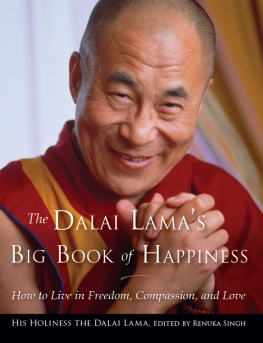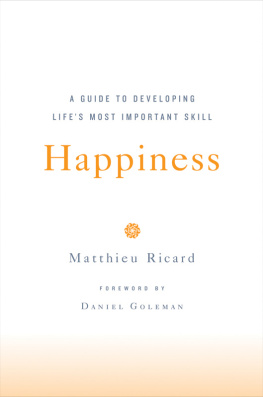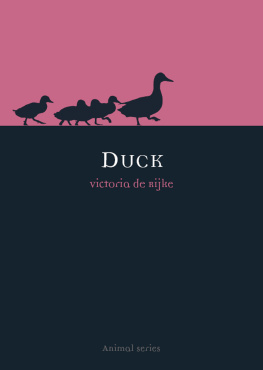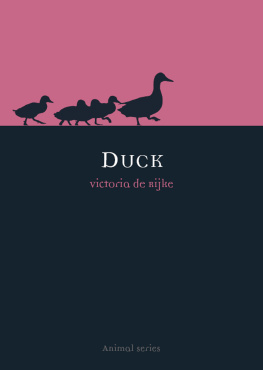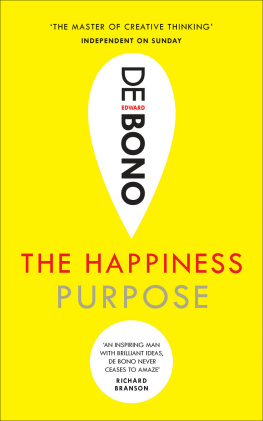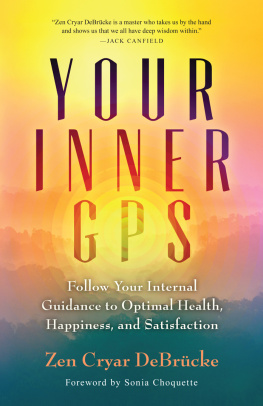
 Talking
Talking
TO DUCKSRediscovering the Joy and
Meaning in Your Life

JAMES A. KITCHENS, Ph.D.
A FIRESIDE BOOK
Published by Simon & Schuster
NEW YORK LONDON TORONTO SYDNEY TOKYO SINGAPORE

FIRESIDE
Rockefeller Center
1230 Avenue of the Americas
New York, New York 10020
www.SimonandSchuster.com
Copyright 1994 by James A. Kitchens
All rights reserved
including the right of reproduction
in whole or in part in any form.
FIRESIDE and colophon are registered trademarks
of Simon & Schuster Inc.
Designed by Richard Oriolo
Manufactured in the United States of America
10 9 8 7 6 5 4 3 2
Library of Congress Cataloging-in-Publication Data
Kitchens, James A.
Talking to ducks: rediscovering the joy and meaning in your life/James A. Kitchens.
p. cm.
A Fireside book.
Includes bibliographical references and index.
1. Spiritual life.
2. Joy.
3. Kitchens, James A.
I. Title.
BL624.K574 1994
158.1dc20 93-34919
CIP
ISBN 0-671-87082-3
ISBN: 978-0-671-87082-9
eISBN: 978-1-439-12378-2
The excerpts from Seasons That Laugh or Weep that appear on pages 41 and 43, copyright by Walter J. Burghardt. Published by Paulist Press and reprinted by permission.
Excerpts from Things Not Solved though Tomorrow Came from The Horseshow at Midnight and An Afternoon of Pocket Billiards by Henry Taylor. Copyright 1992 by Henry Taylor.Published by Louisiana State University Press and reprinted by permission.
Excerpts from The Voyage of the Dawn Treader by C. S. Lewis are published by Lions, an imprint of HarperCollins Publishers Limited, and reprinted by permission.
The poem, MeA Question by Dorothy Dickson Rishel, is reprinted by permission of the author. Dorothy Dickson Rishel (who was eleven years of age when she wrote this poem) is now an ordained United Methodist Minister and has a Ph.D. in clinical psychology.
Excerpts from The Power of the Powerless by Christopher de Vinck, copyright 1988 by Christopher de Vinck, are used by permission of Doubleday, a division of Bantam Doubleday Dell Publishing Group.
Excerpts from The Song of the Bird by Anthony de Mello, copyright 1982 by Anthony de Mello, S.J., are used by permission of Doubleday, a division of Bantam Doubleday Dell Publishing Group.
Excerpts from Soul Making by Alan Jones, copyright 1985 by Alan Jones, used by permission of HarperCollins Publishers.
Excerpts from The Primal Mind by Jamake Highwater, copyright 1981 by Jamake Highwater, are used by permission of HarperCollins Publishers.
continued on page 208
To Rachel, with love
Beloved, we are always in the wrong,
Handling so clumsily our stupid lives,
Suffering too little or too long.
Too careful in our selfish loves:
The decorative manias we obey
Die in grimaces round us every day.
Yet through their tohu-bohu comes a voice
Which utters an absurd commandRejoice.
W. H. Auden, In Sickness and in Health
CONTENTS

Acknowledgments

I wish to thank the hundreds of students, friends, and clients with whom I have shared life over the last twenty years. They have taught me far more than I have ever taught them, and they have contributed to my healing as a person in ways far beyond their awareness or my own.
I have included many of their stories in the pages that follow because I believe that a story conveys truth more efficiently than a lengthy explanation. Every story in these pages is true. If the individual whose story is being shared is designated by both first and last name, the account is true down to the last detail. Each of these persons has read what is said of him or her in these pages and has given permission for his or her story to be included. If only a first name is given, the story is a composite of stories of a number of clients with whom I have worked as a therapist.
I have also included my own story, because I know myself better than I know anyone else.
Preface

And they lived happily ever after.
So ends the childhood story. The struggle is over, and everybody is safe and happy. We can all breathe easier because the big, bad wolf is destroyed, the witch-mother has been thrown into the oven, and the giant has fallen to his death as Jack chopped the beanstalk down. The danger is past and the victory won. Everythings okay.
These stories, and their adult counterparts, encourage us to divide life into good and bad. We seek the good and dodge the bad. Struggle, conflict, and turmoil are bad. Bad is losing and not getting the things we want. Good, on the other hand, is winning and having all the things we desire. These stories encourage us to believe that joy and peace and happiness are possible only after the struggle is over. Like the hero of an old western, we believe that if we confront the enemy with courage and the will to win, we will inevitably overcome. Right prevails. The conflict ends, and we ride away victorious into the sunset. With each struggle we await the delightful outcome of winning the final victory, getting what we want, and living happily ever after.
But life doesnt turn out like that at all. As Edna St. Vincent Millay reminds us, It is not true that life is one thing after anotherits one damn thing over and over.
Life offers no final victory. In fact, life offers no final anything. We describe life as process, a word originating from a Latin root that means to go forward. Process is what happens between the beginning of a journey and the arrival at a destination. But the process of life is not a straight line. Rather, it is a circle and, as such, involves continuous development, change, variety, and growth. To experience life as a process, then, we must advance.
The process does not end so long as life itself does not end. Nor should we want it to, because joy is found as much during the journey as in the arrival. Lifes constant movement and challenges are the birth-pangs of the soul. The paradox of the soul is that we find joy in becoming.
Of course, accomplishment feels good. A job well done gives great satisfaction. But there are equally great joys which we may discover in the process. Once Christopher Robin asked Winnie the Pooh what he liked doing best in the world. Pooh took some time to reflect before answering. Eating honey was high on his list, and he knew that it was a very good thing to do. Yet he realized that there was a moment just before you begin to eat it which was better than when you were. Pooh somehow knew that the anticipation and the process are preferable to achieving the goal.
Next page

